| |
|
|
|
|
|
|
|
|
|
|
| |
| |
 |
|
| |
田润德
编译文/图 2020-07-18
20:36 |
|
| |
|
|
|
|
| |
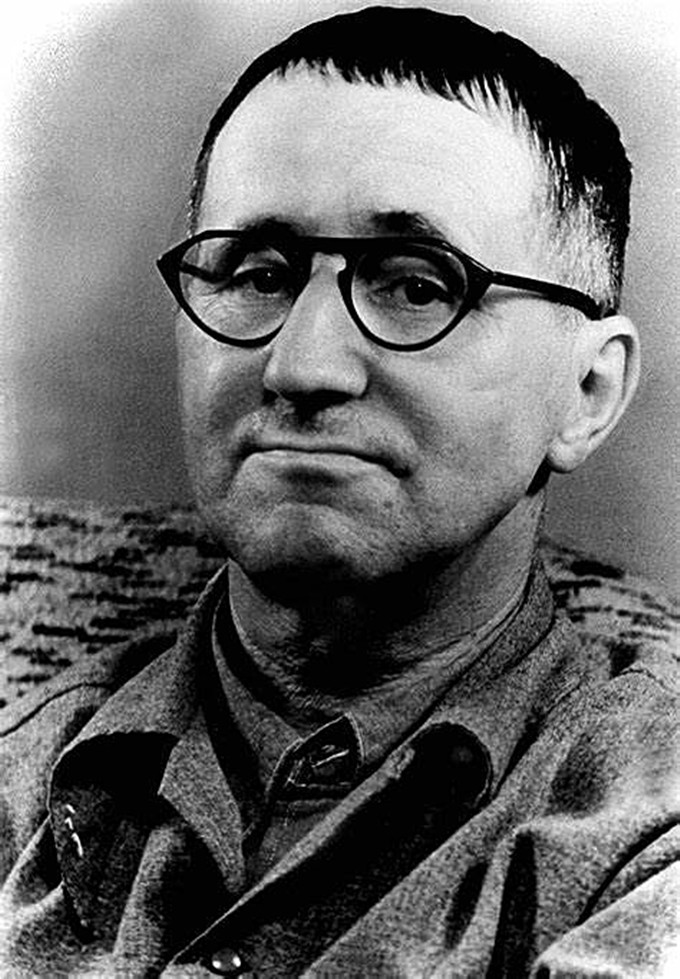 |
|
|
|
| |
贝尔托·布莱希特(Bertolt
Brecht,1898——1956) |
|
|
|
| |
|
|
|
|
| |
布莱希特和魏尔歌剧《马哈哥尼城的兴衰》法国艾克斯普罗旺斯音乐节
(2019)
|
|
|
|
| |
这部歌剧是库特·魏尔与剧作家Bertolt Brecht多次合作的成果之一。
普罗旺斯地区艾克斯音乐节的这次演出标志着比利时导演Ivo van Hove
和芬兰指挥家Esa-Pekka Salonen的又一次新的和备受期待的合作。马哈
贡尼(Mahagonny)是一个幻觉之城,位于沙漠中间,由骗子建立。根
据库特·威尔(Kurt Weill)在1930年的说法,这座放荡的城市是“当
今生活的寓言”。它也是资本主义的寓言,是“复活的世界,唤起了
我们的社会及其边缘化阶级”,正如伊沃·范·霍夫(Ivo van Hove)
把它放在今天的背景环境下。
1930年,该歌剧在德国被禁止发行。布雷希特违背了古典歌剧的传统
形式,在这部作品中,他尝试了史诗般的戏剧,并提出了一种非线性
叙事方式,打破了戏剧的幻想,迫使观众放弃了被动性。此外,Weill
的音乐简直令人赞叹,融合了爵士乐,歌舞表演和流行歌曲。
伊沃·范·霍夫(Ivo van Hove)以其社会承诺的舞台表演而闻名,
他选择在电影制片厂中设定动作并使用视频屏幕,他认为这对于马哈
贡尼市来说“必不可少” 。
|
|
|
|
| |
|
|
|
|
| |
音乐历史上的今天
1927年7月18日,布莱希特与魏尔合作的首次成果《马哈哥尼城的兴衰》(Mahagonny
Songspiel)在高雅的巴登-巴登音乐节上演。当我们唱到最后一首歌并且挥舞标语(我的标语上是“为了魏尔”)时,示威开始了——全体观众起立,有鼓掌的、有喝倒彩的、有吹口哨的。布莱希特周到地为我们提供了哨子,这样我们就可以站在舞台上回敬那些口哨了。(洛特•兰雅)
贝尔托·布莱希特(Bertolt
Brecht,1898——1956),是一位著名的德国戏剧家与诗人。1898年2月10日,贝尔托·布莱希特生于德国巴伐利亚奥格斯堡镇。年轻时曾任剧院编剧和导演。曾投身工人运动。1933年后流亡欧洲大陆。1941年经苏联去美国,但战后遭迫害,1947年返回欧洲。1948年起定居东柏林。1951年因对戏剧的贡献而获国家奖金。1955年获列宁和平奖金。
1956年8月14日布莱希特逝世于柏林。
贝尔托·布莱希特1898年2月10日出生在巴伐利亚的奥古斯堡。父亲是一家造纸工厂的厂长,母亲在年轻时就为乳癌所苦。小时候的布莱希特是个体弱的孩子,由于先天的心脏疾病,他曾被送到疗养院修养,六岁到教会国小念书,接受拉丁和人文科学的教育,在学校期间他便开始写作,成为学生杂志《收获》的发行兼编辑。他十六岁开始为地方报纸写文章,并创作了第一个剧本《圣经》。
1917年,布莱希特到慕尼黑的路德维希-马克西米立克大学读医学,期间他参加了阿尔图·库切尔的戏剧研究班,但因为不喜欢和同班同学的相处模式,而经常翘课跑回家。却借助此间闲暇开始创作剧本《巴尔》。第一次世界大战期间,布莱希特虽然曾受命到军医院当卫生兵,但很快的就结束了,因为他公开表态对战争不抱信心。
还未成为幕尼黑的戏剧家之前,布莱希特在一家报社《人民意志报》找到写剧评的工作。1922年布莱希特的《夜半鼓声》在慕尼黑和柏林的剧院上演,藉此布莱希特获得有名的克莱斯特最佳年轻剧作家奖。布莱希特也开始稳定他的人际关系,于24岁娶了歌剧演唱家玛丽安娜。次年生了他们的第一个女儿汉娜。虽然结了婚,很少花时间陪妻子和女儿的布莱希特还是有其他的婚姻问题。1924年搬到柏林后,他认识了维也纳信仰共产主义的女演员海伦娜·魏格尔,并积极的追求海伦娜。海伦娜还为他生了一个私生子叫做施坦芬。后来布莱希特也认识了伊丽莎白·霍普特曼,并和她合作。1926年布莱希特
和玛丽安娜离婚,1929年和海伦娜结婚。
1933年国会纵火案发生后,布莱希特和他的家人逃到苏黎世,后来又到丹麦、芬兰,1941年旅行经过莫斯科、海参崴、圣·彼得罗港。直到1954年布莱希特获颁国际斯大林和平奖。1956年8月14日,当他在研究贝克特的《等待戈多》时,因心脏病发而过世,被葬于柏林的多罗延公墓。从1933年起,在长达15载的流亡生涯里,布莱希特的足迹踏遍了欧美每一个角落。
在苏黎世的旅馆,布莱希特见到了亨利希曼、西格斯和本雅明,结下了深厚的友谊;在莫斯科,他观看了京剧大师梅兰芳的访问演出;在好莱坞,他跟喜剧天才卓别林成了好友,机缘巧合之下与当时访问美国的老舍相谈甚欢。如果说遭遇世界大战引发了布莱希特对政治的思索,那么漂泊异乡的十五年更使他接触到了社会深层,浮世百态。这不仅是流亡的旅程,更是布莱希特作为一朵戏剧灵魂成长的心路历程,带给他的戏剧以不朽的魅力。时代是人无法选择,如何在命运的漂泊中寻找到自身生存,甚至蓬勃生存的方式,布莱希特无疑是一位无可指摘的尊师。
今日视频:布莱希特和魏尔歌剧《马哈哥尼城的兴衰》法国艾克斯普罗旺斯音乐节(2019)。
|
|
|
|
| |
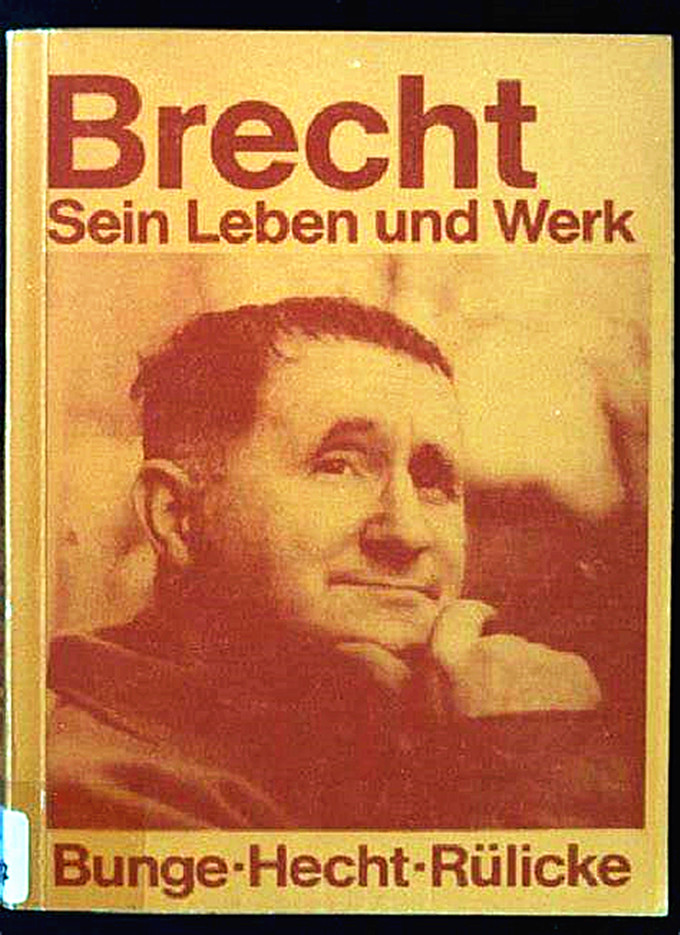 |
|
|
|
| |
贝尔托·布莱希特(Bertolt
Brecht)著作等身,具有极强的论辩能力。他的理论与著作有《戏剧小工具篇》、《戏剧小工具篇补遗》、《大胆妈妈和她的孩子们》、《梅辛考夫》、《母亲》、《四川好人》、《高加索灰阑记》、《伽利略传》《圆头党和尖头党》、《第三帝国的恐怖与灾难》、《卡拉尔大娘的枪》、《潘蒂拉老爷和他的男仆马狄》以及改编的舞台剧《在第二次世界大战中的帅克》、《高加索灰阑记》等。
他还以演说、论文、剧本的注释形式,阐述史诗戏剧的理论原则和演剧方法,其中较重要的有《中国戏剧表演艺术的间离方法》、《论实验戏剧》、《买黄铜》、《表演艺术新技巧》等。1948年后,剧作有《公社的日子》、《杜朗多》等。 |
|
|
|
| |
布莱希特希望这种认识有助于观众们分析解释剧中人类关系的历史条件,即社会中人与人的联系,从而发现其中蕴含的作用于人与人社会关系的研究中的理性的科学精神。
为制造这种“陌生化”,
布莱希特对旧有戏剧中的“共鸣”模式进行批判,认为有必要消除这种刻意也是着力营造的观众与剧中事件人物的共鸣。这种共鸣使观众将自己与剧中人物联系起来,陷入出神入迷的状态,从而失去了对剧中事件与人物的批判能力。布莱希特努力使这种能力重新回到观众中去,保持与剧中人物的距离,从而恢复观众进行批判的自由,有可能理解所表演的东西的真正含义。对共鸣消除的第一步就是演员必须游离于他所表演的剧情之外,“既然他无意把观众引入一种出神入迷的状态,他自己也不可以陷入出神入迷的状态”,演员应以一个表演者而不是剧中人物的形象出现在舞台上,“演员一刻都不允许使自己完全变成剧中人物……演员自己的感情不应该与剧中人物的感情完全一致,以免使观众的感情完全与剧中人物的感情一致,”必须使观众感受到演员在表演时的思维,用清醒的思维把观众引导到他们的现实世界中来。
而剧本中的音乐舞蹈和舞台设计,都应与戏剧本身有所隔离,从戏剧身上收回他们各自的独立性,这些戏剧艺术的姊妹艺术是为了共同的事业把各自的艺术联合在一起,他们在这里的任务“不是为了创造一部‘综合性艺术的’,从而全都放弃和失掉本身的特点,相反,它们应该同戏剧艺术一起,用不同的方法来完成共同的任务,”与此同时,就戏剧的结构形成,布莱希特也加以改造,打破了剧情的完整性,不时用合唱,歌曲,以及它们与道白之间的突然过渡,使各场之间本来就松弛的连接中断或形成形式上的巨大差异,甚至让人物亲自出现,直接向观众发表议论,以提醒观众这是在演出的事实,使观众与舞台上的人物事件隔离开来,消除它们之间的“共鸣”,形成“陌生化”的效果。
虽然,布莱希特的种种方法都是为了截断观众与舞台在情感上的联系,但如果把消除这种“共鸣”看作是布莱希特戏剧改造的全部目的,那就大错特错了。布莱希特的目的只有一个,那就是使理性的判断力重新回到观众中去,消除共鸣只是一种强制性的手段,也是并不高明的手段。他在《表演艺术的新技巧》中明确提出:“表演艺术不必完全拒绝采用共鸣,然而它必须能使观众产生批派的态度,这样做不会使他丢掉自己的艺术特性。这种批判的态度并不是背离艺术,如人们常说的那样,它既是趣味盎然的,又是带有感情色彩的,它本身就是一种体验。史诗剧重要主张之一就是,批判的态度能够成为一种艺术的态度。”布莱希特也并不排斥戏剧中的感情因素,而且他也希望在保持观众的间隔感时尽量把感情加入戏剧中去,他认为理性与感情的对立存在于“非理性的人脑袋里,这是因为它们的感情生活是十分靠不住的。”布莱希特将指出理性与感情在戏剧中是可是达到辩证统一的,他的一段论述清晰的表达了他的这一观点:
“一方面在利用理性因素的情况下,产生共鸣作用,另一方面也可以用纯感情的方式,引起陌生化效果。斯坦尼斯拉夫斯基为产生共鸣而采用了冗长的分析,而在新年市场上的全景画里(《涅罗观看罗马大火》《里斯本地震》),陌生化效果是纯感情的。在亚里士多德式戏剧中,共鸣也是一种思想批判,非亚里士多德戏剧也可希望有充满感情的批判。”
由此可见,布莱希特的理性戏剧观念并不是要消除戏剧中的感情因素,相反,他认为在保持戏剧的间隔感,使观众们保持对剧中人物事件的批判能力的同时,这种感情的加入越多越好,因为他提出“陌生化”理论的唯一目的,只是使理性重新回到剧场中的“科学时代的孩子们”身边,使他们享受到有着时代特征的真正娱乐。 |
|
|
|
| |
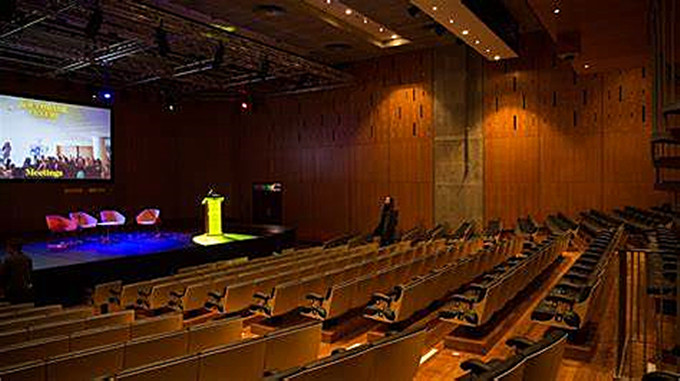 |
|
| |
布莱希特和魏尔歌剧施展空间的剧场 |
|
|
|
| |
世界戏剧三大表演体系即分别以斯坦尼斯拉夫斯基(Konstantin·Stanislavsky,苏联戏剧家),布莱希特(Bertolt
Brecht,德国戏剧家),梅兰芳为代表的三种表演体系。二十世纪以来,有三个戏剧艺术家团体产生了世界性影响,这就是以斯坦尼斯拉夫斯基为首的莫斯科艺术剧院,布莱希特领导的柏林剧团,以梅兰芳为代表的中国京剧艺术家群体。这三个戏剧艺术家团体创造的戏剧艺术,各自自成一格,体现了现代三种不同的戏剧观或戏剧美学思想。
然而,最早提及该观点的孙惠柱先生是因为误引了黄佐临先生的论题,之后又被以讹传讹。上文所提及的三人除斯坦尼斯拉夫斯基外,表演方式均不成体系(布莱希特的表演方式是沿袭了斯坦尼)。 |
|
|
|
| |
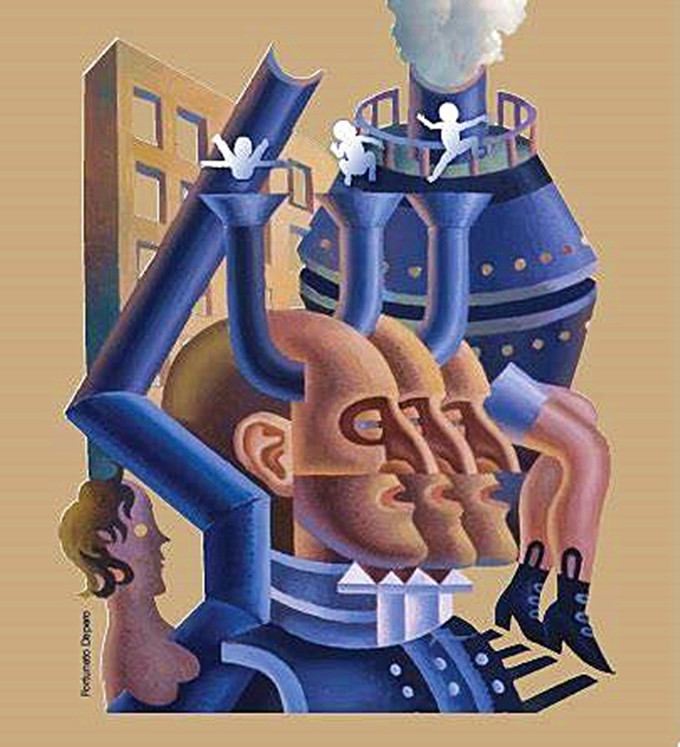 |
|
|
|
| |
贝尔托·布莱希特(Bertolt Brecht)戏剧海报 |
|
|
|
| |
The three
acting systems of world drama are represented by Konstantin Stanislavsky
(A Soviet dramatist), Bertolt Brecht (a German dramatist) and Mei
Lanfang.Since the 20th century, three groups of dramatic artists have
exerted worldwide influence, namely The Moscow Art Theater headed by
Stanislav Sky, the Berlin Theater led by Brecht, and the Chinese Peking
Opera artists represented by Mei Lanfang.The dramatic art created by
these three groups of dramatic artists has its own style, which reflects
three different modern views of drama or aesthetic thoughts of drama.
However, Mr. Sun Huizhu, who first mentioned this point of view,
mistakenly quoted Mr. Huang Zuolin's thesis and then was wrongly
informed.Except for Stanislavsky, none of the three above performed in a
systematic way (Brecht followed Stanny's lead). |
|
|
|
| |
《马哈哥尼城的兴衰》简介 |
|
|
|
| |
《马哈哥尼城的兴衰》由德国著名戏剧家布莱希特创作,首演于1930年,描写了阿拉斯加的森林里的保尔等四个伐木工人,以为金钱能够带来幸福,来到由既得利益者们创造的马哈哥尼城寻求欢乐,他们经历了诱惑、浮华、飓风和白日梦,结果,一个被撑死,一个被打死,一个背叛了兄弟,保尔则因为缺金少钱而被正义法庭判处死刑。布莱希特笔下的“马哈哥尼城”,是一座永恒的城市;剧中的种种情节,不免引起人们对社会现状的感喟。 |
|
|
|
| |
The Rise and Fall
of The City of Maagoni
The Omaha elder brother's rise and fall of the city of the German famous
dramatist brecht, premiered in 1930, the description of the forests of
Alaska Paul and other four lumberjack, think money can bring happiness,
came to Omaha created by the vested interests are brother's city to seek
happiness, they experienced a temptation, flashy, hurricanes and
daydreaming, as a result, a support dead, one was killed, a betrayed
brother, Paul, because of the lack of money and the gold was justice
court sentenced to death.Brecht's "Maagoni city" is an eternal city;The
various scenarios in the play inevitably arouse people's sigh for the
social situation. |
|
|
|
| |
 |
|
| |
《哈哥尼城的兴衰》剧照( Aufsteig und Fall der Stacit
Mah—agonny)(布莱希特)1929 |
|
|
|
| |
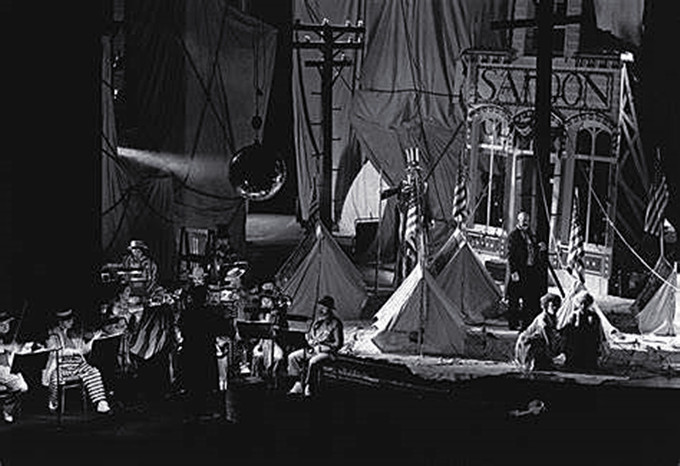 |
|
| |
《哈哥尼城的兴衰》剧照( Aufsteig und Fall der Stacit
Mah—agonny)(布莱希特)1929 |
|
|
|
| |
 |
|
| |
《哈哥尼城的兴衰》剧照( Aufsteig und Fall der Stacit
Mah—agonny)(布莱希特)1929 |
|
|
|
| |
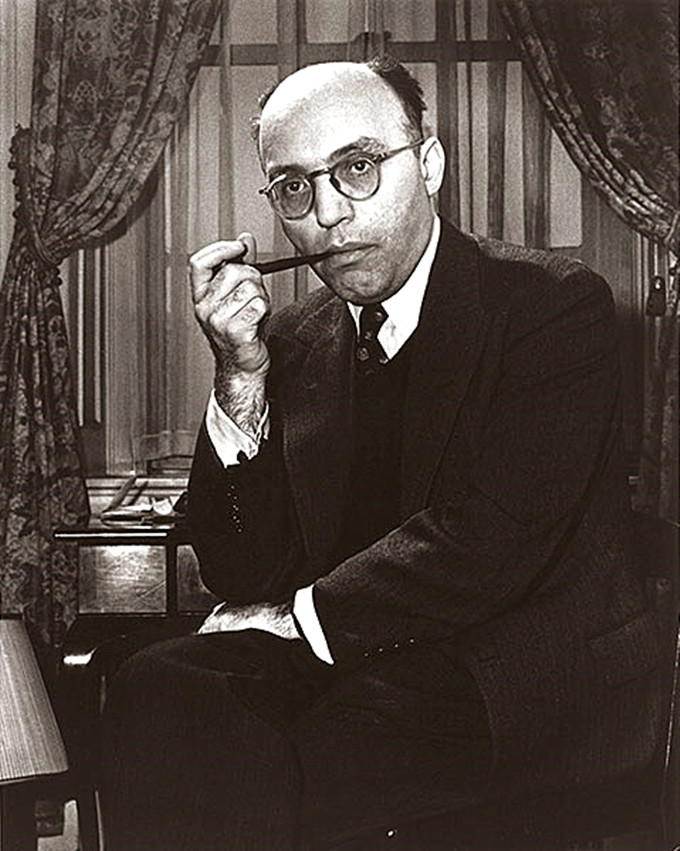 |
|
|
|
| |
库特·魏尔(Kurt Weill, 1900-1950) |
|
|
|
| |
库特·魏尔(Weill, Kurt
1900年生于德绍;1950年卒于纽约)。德国作曲家。1918~19年求学于柏林高等音乐学校(师从洪佩尔丁克学习作曲),1921~24年从布索尼私人学习。1918~21年在德绍任歌剧辅导,后在吕登沙伊德任剧院指挥。创建新的通俗歌剧乐派,在德国引起广泛注意,纳粹掌权后,对此极端敌视。第一部歌剧《主角》(Der
Protagonist)于1926年在德累斯顿上演。1927年与贝托尔特·布莱希特(Bertolt丰Brecht)合作,创作关于林德伯格飞越大西洋的广播康塔塔,并合作创作歌唱剧《马哈哥尼》(
Mahagonny), 1929年他们将此剧重写,成为讽刺美国生活方式的三幕歌剧《马哈哥尼城的兴衰》(Rise and Fall of the
City of Mahagonny). 1928年他在柏林,上演了现代版本的《乞丐歌剧》(The Beggar's
Opera),名为《三分钱歌剧》( Die Dreigroschenoper) (The Threepenny
Opera)获得成功,内容讽刺当时德国生活中的问题,它的爵士化、刺耳然而光彩夺目的配器烘托出那一特定时期的气氛,甚至未曾体验过这种生活的人也能领悟。布莱希特的歌词和洛特·莱妮亚(Lotte
Lenya)(后成为魏尔之妻)的歌唱是歌剧成功的重要因素。1933年魏尔被驱出德国,先去巴黎,后赴伦敦,最后于1935年到纽约。在美国他创作了几部成功的百老汇音乐喜剧,它们缺少他的德国歌剧之辛辣,然而甚有价值。动人的旋律“九月之歌”是为《纽约荷兰人的节日》(Kniekerbock—er
Holiday)创作的,他去世后,《三分钱歌剧》(The Threepenny C)pera)由马克·布利茨坦(Marc
Blitzstein)译成英语台本上演,在纽约连演不衰。魏尔的音乐象科沃德的音乐一样(但比他低一级),捕捉住时代的气息,同时成功地将爵士音乐和古典音乐的要素融于一炉。 |
|
|
|
| |
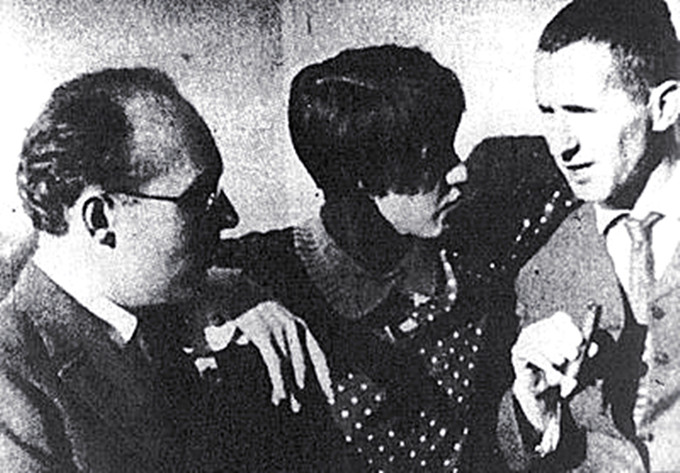 |
|
|
|
| |
贝尔托·布莱希特(Bertolt Brecht)和库特·魏尔(Kurt
Weill) |
|
|
|
| |
Weill, Kurt, was
born in 1900 in Dessau.He died in New York in 1950.German composer.He
studied at the Berlin High School of Music from 1918 to 19 (he studied
composition under Humperdink), and took private lessons from Busoni from
1921 to 24.From 1918 to 21, he was an opera tutor at Dessau and then a
theatre conductor at Ludenshaid.The creation of a new popular opera
school was widely noticed in Germany and was extremely hostile to the
Nazis when they came to power.The first opera, Der, was performed in
Dresden in 1926.1927 and beto er, Brecht, Bertolt Brecht) cooperation,
the creation of Lindbergh transatlantic radio cantata, creation and
cooperation to sing opera "the elder brother of the Omaha," (Mahagonny),
in 1929 they will this rewriting, become irony opera in three ACTS the
American way "of the City of Omaha elder brother's Rise and Fall (Rise
and Fall of the City of Mahagonny). In 1928 he was in Berlin,Staged a
modern version of The Beggar Opera (The Beggar 's Opera), called "The
Threepenny Opera" (Die Dreigroschenoper) (" The Threepenny Opera)
successful, content irony at that time, The problems of German life,
it's jazz, sharp however dazzling instruments foil The atmosphere of
that particular period, even people who have experienced this kind of
life can understand.Brecht's lyrics and the singing of Lotte Lenya
(later To be Weill's wife) were important factors in the opera's
success.Weill was driven out of Germany in 1933, first to Paris, then to
London, and finally to New York in 1935.In the United States he created
several successful Broadway musical comedies that lacked the spice of
his German opera but were valuable.The moving melody "Songs of
September" was composed for "Kniekerbock-er Holiday" and, after his
death, "The Threepenny C Pera" was translated into English by Marc
Blitzstein and has continued to run in New York.Weill's music, like
Coward's (but a notch below him), captured the spirit of The Times while
successfully blending elements of jazz and classical music. |
|
|
|
| |
|
|
|
|
| |
|
|
|
|
| |
Today in the
history of music
On July 18, 1927, The first collaboration between Brechter and Weill,
"Mahagonny Songspiel," was performed at the elegant Baden-Baden
Festival.When we got to the last song and waved signs (mine was "For
Weill"), the demonstration began -- the entire audience rose to applaud,
boo, and whistle.Brecht had thoughtfully provided us with whistles, so
that we could stand on the stage and return the blows.(Lott Lanya)
Bertolt Brecht (1898-1956) was a famous German dramatist and poet.Berto
Brecht was born in Augsburg, Bavaria, Germany, on February 10, 1898.He
was a theatre writer and director when he was young.He was involved in
the worker's movement.After 1933, they went into exile on the European
continent.He went to America via the Soviet Union in 1941, but was
persecuted after the war and returned to Europe in 1947.He settled in
East Berlin in 1948.In 1951 he received a state prize for his services
to drama.He received the Lenin Peace Prize in 1955.Brecht died in Berlin
on August 14, 1956.
Berto Brecht was born in Augusburg, Bavaria, on February 10, 1898.His
father was the director of a paper factory, and his mother suffered from
breast cancer when she was young.As a weak child, Brecht was sent to a
nursing home because of a congenital heart disease. At the age of six,
he attended church elementary school, where he received a Latin and
liberal arts education.At sixteen, he began writing articles for the
local newspaper and wrote his first play, the Bible.
In 1917, brecht went to Study medicine at Ludwig Maximilik University in
Munich, where he attended Artur Coetscher's theatre studies class, but
often skipped class to run home because he did not like the pattern of
his classmates.But with this spare time began to write the play
"Baal."During World War I, Brecht was assigned to a military hospital as
a medical soldier, but it was soon over because he publicly disbelieved
in the war.
Before becoming a playwright at Munich, Brecht took a job writing
theater reviews for the newspaper People's Will.In 1922 Brecht's "The
Midnight Drum" was staged in theaters in Munich and Berlin, for which
Brecht won the prestigious Kleist Prize for best young playwright.Brecht
also began to steady his relationships, marrying opera singer Mariana at
the age of 24.Their first daughter, Hannah, was born the following
year.Although married, Brecht, who rarely spends time with his wife and
daughter, has other marital problems.After moving to Berlin in 1924, he
met Helena Weigel, a Viennese communist actress, whom he actively
pursued.Helena also bore him an illegitimate son named Stefan.Brecht
later met and collaborated with Elizabeth Hoptman.Brecht divorced
Marianne in 1926 and married Helena in 1929.After the congressional
arson in 1933, Brecht and his family fled to Zurich and later to Denmark
and Finland, traveling through Moscow, Vladivostok, and St. Pietro
harbor in 1941.In 1954 Brecht was awarded the International Stalin Peace
Prize.He died of a heart attack on 14 August 1956 while studying
Beckett's waiting for Godot and was buried in Berlin's Dorothea
Cemetery.Starting in 1933, during his 15-year exile, Brecht traveled to
every corner of Europe and the United States.
At his hotel in Zurich, Brecht met Henry Seaman, Sigus and Benjamin, and
struck up a deep friendship.In Moscow, he saw a visiting performance by
The Peking Opera master Mei Lanfang.In Hollywood, he befriended the
comic genius Charlie Chaplin, and by chance fell in love with his old
roommate who was visiting America at the time.If the encounter with the
world war triggered Brecht's political thinking, then fifteen years of
wandering in a foreign land made him more exposed to the depth of
society, floating in the world.This is not only the journey of exile,
but also the journey of Brecht's growing up as a drama soul, which
brings his drama with immortal charm.The age is people can not choose,
how to find their own drifting in the fate of survival, even the way to
flourish, Brecht is undoubtedly an unimpeachable teacher.
Video of the day: The Rise and Fall of Mahagoni by Brecht and Weill.
Aix-en-provence, France (2019).
|
|
|
|
| |
|
|
|
|
| |
未得原作者编者授权严禁转载www.mt77.com任何内容 |
|
|
|
|
|
|
|
|
|
|
|
|
|
|


